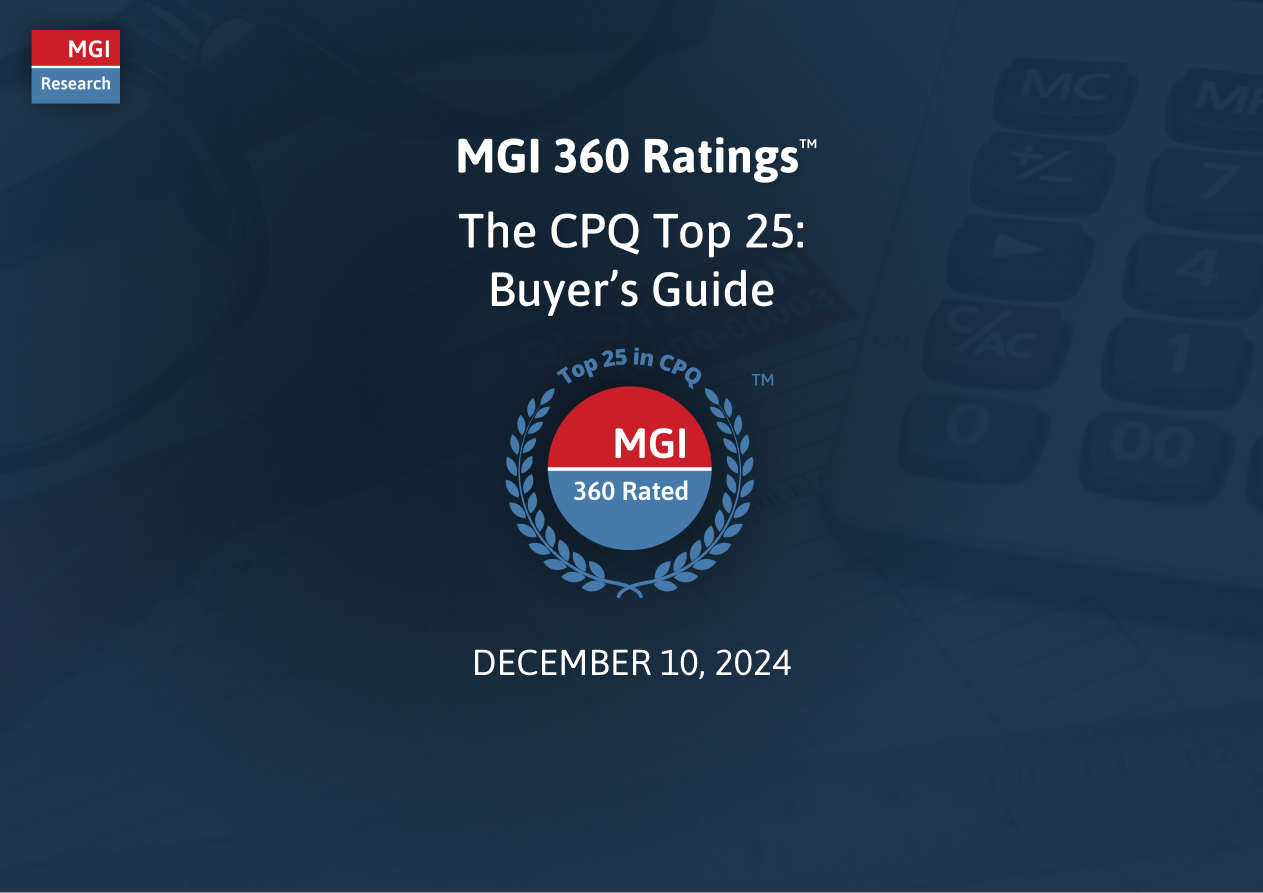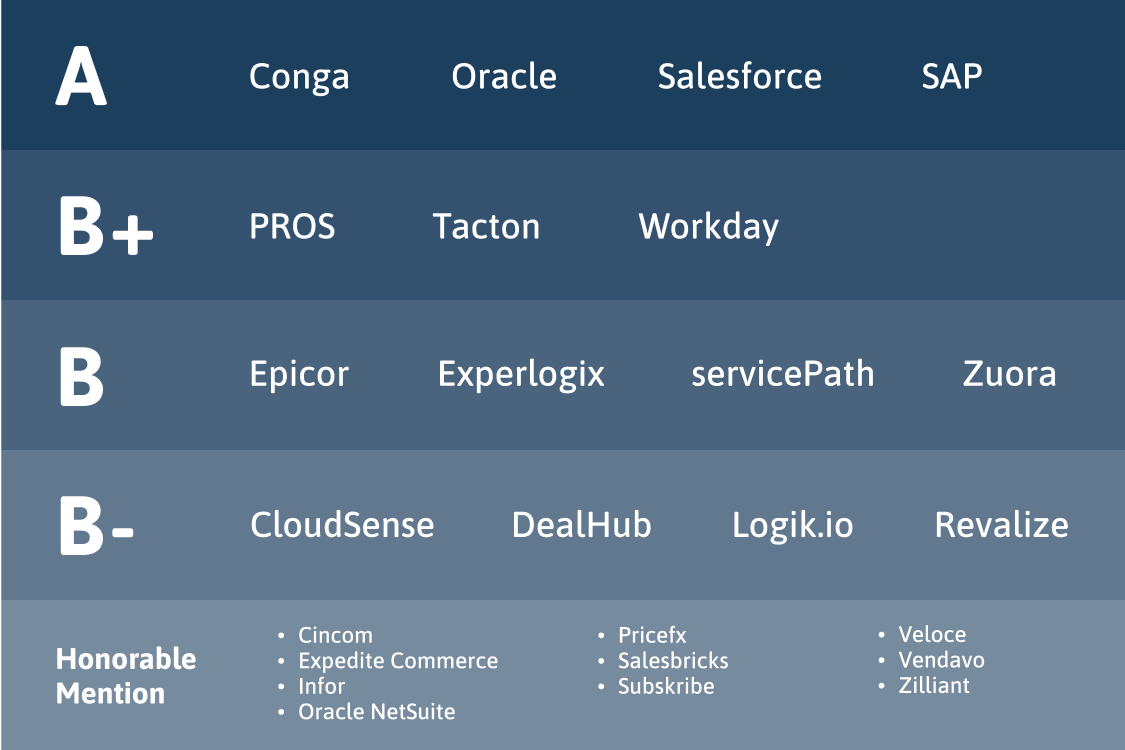
Approximately 50% of first-time Configure Price Quote (CPQ) software buyers experience implementation time and cost overruns due to poor preparation, lack of data integrity, and making the wrong vendor choice.
The CPQ Top 25 Buyer’s Guide aims to help CPQ software selection and negotiation teams (e.g., CROs, CFOs, CIOs, Sales Ops, and IT teams) make better, more effective, and more efficient CPQ software decisions. Whether evaluating a new set of potential CPQ suppliers or reassessing an existing relationship, this guide contains essential elements to understand the capability range and benefits of modern CPQ solutions.
This Buyer’s Guide highlights current and future CPQ market dynamics and provides analysis and MGI 360 Ratings™ of the 25 most consequential vendors in this space. This report also includes four MGI MarketLens™ charts: a set of proprietary lenses highlighting how solutions compare in terms of their agility, ability to handle business complexity, and support for volume, go-to-market strength, and solution strength. The MGI MarketLens helps buyers construct a shortlist of potential suppliers, compare an existing CPQ implementation with potential alternatives, and understand the relative strengths and weaknesses of solutions; it also gives vendors a tool for benchmarking their performance in these key areas.

CPQ Vendors Under Coverage
The CPQ Top 25 Buyer’s Guide provides ratings and analysis of the 25 most significant suppliers of CPQ solutions. It includes MGI 360 Ratings™ of 15 suppliers and analysis of 10 honorable mention vendors. According to MGI Research, these are the most significant solutions and suppliers in the market today. Only the top vendors are included in this report. MGI 360 Ratings are calculated via a rigorous quantitative rating (scored 0-100). MGI 360 Rated™ suppliers are also given a letter grade based on quartile rating results, as well as a qualitative analyst outlook (positive, neutral, or negative).
The 15 vendors receiving full 360 Ratings and letter grades are: CloudSense, Conga, DealHub, Epicor, Experlogix, Logik.io, Oracle, PROS, Revalize, Salesforce, SAP, servicePath, Tacton, Workday, and Zuora.
The 10 suppliers receiving honorable mention, but not rated for this report, are: Cincom, Expedite Commerce, Infor, Oracle NetSuite, Pricefx, Salesbricks, Subskribe, Veloce, Vendavo, and Zilliant.
MGI Research tracks approximately 30 more vendors in this space and reserves the right to publish ratings and analyses on select vendors as deemed worthy and appropriate.
What is Configure Price Quote (CPQ)?
Configure Price Quote (CPQ) is a software discipline that enables companies to automate complex sales processes. It is typically packaged as a mini-suite of related capabilities enabling precise product configuration, accurate pricing, and rapid quote presentation across all types of channels – direct, indirect, partner/reseller, self-service, guided e-commerce, and OEMs. CPQ is a key element of the agile monetization platform.
CPQ solutions promise a smooth end-to-end customer experience, reduced friction in the sales process, and improved precision and accuracy of product combinations, pricing, terms, and conditions. When properly implemented, CPQ reduces the possibility of quote rejection due to human error. It makes the sales channel smarter and faster, and makes the sales process and downstream outcomes more predictable.
CPQ allows mass customization of relatively complex product lineups, enabling channels to sell complex products at scale. This applies to a broad range of product types – from digital subscriptions and financial services to cars and wind turbines. CPQ has applications in a broad spectrum of industries and business models across a range of stages of maturity: B2B and B2C, physical, digital, and hybrid combinations of goods and services, across myriad channel combinations.
To understand this market, buyers must consider the specific CPQ application(s) their organization requires – does the use case call for a highly-agile, mass-market solution? Or do their specifications and use cases necessitate a vertically-oriented solution that requires highly skilled implementation and administration resources? CPQ is not a single market, but three distinct submarkets: C, P, and Q. MGI Research will publish an in-depth analysis of pricing-focused solutions in 2025.
CPQ Top 25 – Why These Companies?
This report focuses on the top 25 vendors in CPQ and provides comprehensive MGI 360 Ratings™ on the top 15. These vendors are among the most consequential CPQ suppliers in the market and merit the attention of buyers, partners, and investors. The MGI 360 Rating methodology is quantitative in nature with a tough, nonlinear grading scale (see the report for more detail). Any vendor among the 15 rated suppliers is, in our view, important and impactful, regardless of the absolute score. The 10 companies receiving honorable mention also merit user attention and may or may not receive full 360 Ratings in future evaluation cycles.
The criteria for inclusion include one or more of the following:
- Market visibility: The company meets one or more of the following characteristics: above-average growth, often included in longlists and shortlists of buyer evaluations, large installed base, and/or most MGI clients express interest in the company or mention them in analyst calls.
- Innovation: The product has unique capabilities and the potential to disrupt the market – buyers should be aware of this product/company, even if it is not a fit for them today.
- Solution strength: Breadth and depth of solution, support for various business models and use cases, and the supplier’s ability to help customers implement and gain value from the solution.
- Demonstrated success: Most, but not all, vendors covered are able to provide MGI with reference customers and partners to interview. Independent of the provision (or lack thereof) of vendor references, MGI conducts its own interviews and field research on customers, partners, and investors.
There are hundreds of CPQ software providers offering products that range from basic sales quoting tools to highly sophisticated product configurators and AI-driven price optimization engines. Vendors are not excluded uniquely based on size (e.g., revenue or customer count below any threshold) or willingness to participate in the research process.
About MGI 360 Ratings™
MGI 360 Ratings™ are a comprehensive structured system for evaluating technology companies. The MGI 360 scores reflect analyst opinions based on a scale of 0 to 100, combined with an analyst outlook (Positive, Negative, or Neutral), across five key pillar scores:
- PRODUCT: How strong is the product’s competitive position?
- MANAGEMENT: How competent and experienced is the management team?
- CHANNELS: Does the company have a sales capability and channels needed to bring products to market?
- STRATEGY: Does the company have a realistic view of the opportunity and a compelling strategy for success?
- FINANCE: Is the company growing and profitable?
Each pillar score is subdivided into numerous sub-categories – in total, over 149 criteria are combined to generate a single MGI 360 rating. We frequently emphasize that the MGI 360 scale is very demanding and companies need to be exceptional in every aspect of their business to command higher scores.

MGI Research assigns a letter grade of A, B+, B, or B- to all 360 Rated suppliers. Letter grades are assigned by dividing the 15 overall 360 Rating scores into four quartiles. The top-performing quartile receives an A grade, the second-highest rated quartile receives a B+, the third quartile receives a B, and the lowest-rated quartile receives a B-.
SPEAK TO AN ANALYST: Organizations looking for additional support in crafting an evaluation strategy and conducting an independent assessment of potential suppliers should contact MGI Research here.
NOT AN MGI CLIENT? Click here to schedule an inquiry.
MGI Research clients can download the Buyer’s Guide below.

